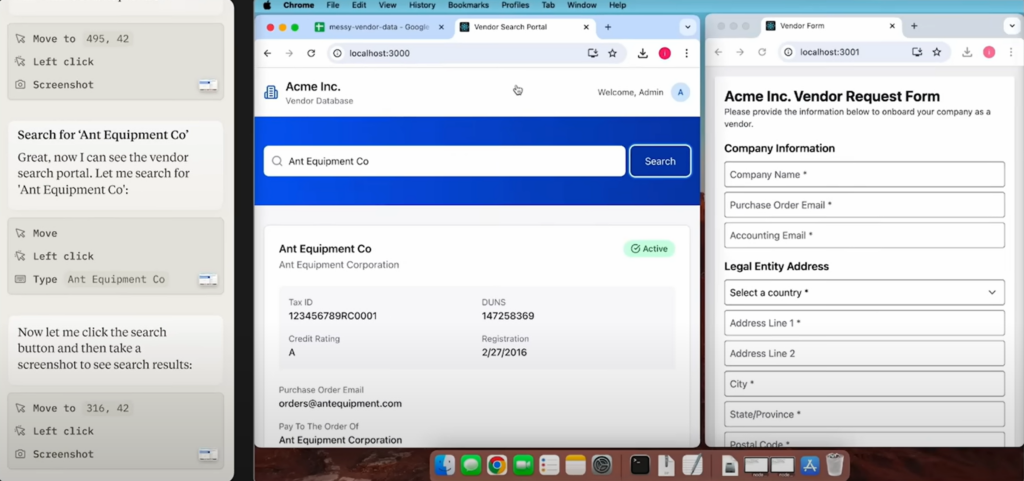Artificial Intelligence (AI) is quickly advancing beyond just conversational chatbots, and Anthropic’s new AI model, Claude 3.5, represents a significant leap in how businesses could harness this technology to automate complex workflows.
The release of Claude 3.5 Sonnet and its sibling model, Claude 3.5 Haiku, introduces a game-changing feature called “Computer Use,” allowing AI to perform tasks across multiple applications just like a human. This new functionality could transform how businesses handle repetitive and time-consuming tasks, from customer service to software development.
For marketing and communications professionals, these advancements present an array of new tools and opportunities to streamline tasks, create more personalised experiences, and improve overall productivity.
Automating Complex Marketing Workflows
Anthropic’s Claude 3.5 is designed to do more than process text. With its “Computer Use” feature, the AI can navigate across different software platforms, interact with user interfaces, and automate workflows that previously required manual intervention. For marketers, this capability opens the door to automating multi-step processes such as managing customer relationships, tracking campaign data, and creating content across platforms.
Take, for example, a scenario in which a marketing team is conducting a detailed analysis of their latest campaign. Instead of manually gathering data from various sources, such as CRM systems, analytics platforms, and email marketing tools, Claude can seamlessly pull the required information, organise it, and even run automated analysis to generate key insights. This ability to handle complex, repetitive tasks across multiple systems can free up marketers to focus on strategic initiatives such as creative content development and customer engagement.
Companies like Canva and GitLab are already exploring how Claude’s advanced features can boost productivity. Canva, for instance, is testing the AI’s ability to automate design creation and editing, while GitLab is using it to improve software testing and deployment processes. For marketing teams, these examples hint at the potential time savings when it comes to handling routine tasks such as content creation, testing email sequences, or managing social media accounts.
Enhanced Personalisation in Customer Communications
One of the most exciting aspects of Claude 3.5 is its potential to drive more personalised customer interactions. By integrating AI into customer service workflows, businesses can ensure faster and more accurate responses to customer queries. Beyond responding to basic questions, Claude can access customer profiles from CRM systems, pull relevant data, and craft tailored responses in real time. For example, if a customer enquires about their previous order or service request, the AI can quickly locate the necessary details and provide an accurate response without human intervention.
AI agents like Claude can automate this process by leveraging user data to create highly targeted messages. A marketing team could use AI to automate the creation of personalised email campaigns that reflect a customer’s browsing behaviour, purchase history, or engagement with previous campaigns. This level of customisation is a key driver in increasing engagement rates, boosting conversions, and ultimately improving customer loyalty.
Furthermore, with Claude’s ability to work across multiple applications, it could integrate seamlessly with social media management tools, automating the process of monitoring customer comments and feedback, while providing consistent and personalised responses across different platforms.
Reducing Human Error in Marketing Operations
One of the perennial challenges in digital marketing is human error, which can occur when handling large datasets or complex workflows. Whether it’s a misplaced decimal point in a budget forecast or an incorrect link in a mass email campaign, small mistakes can have significant consequences. AI agents like Claude reduce this risk by performing tasks consistently and accurately across platforms.
For instance, Claude’s ability to complete complex, multi-step tasks, such as filling out vendor forms or running customer segmentation analysis, can dramatically reduce the risk of human error in these processes. As the technology matures, we can expect to see it handling even more complex tasks, such as managing multi-channel ad campaigns or optimising digital strategies based on real-time performance data.
This improved accuracy is particularly valuable when scaling marketing operations, as businesses can rely on AI to handle repetitive tasks with precision, allowing human workers to focus on higher-level decision-making and creative work.
The Challenges and Future of AI in Marketing
Despite the significant potential, the use of AI agents like Claude in marketing and communications is still in its early stages. Anthropic has built several safeguards to ensure that AI systems are used responsibly, including limiting access to sensitive applications and implementing privacy protections. Nevertheless, as AI continues to evolve, there are challenges to address, particularly in ensuring that AI systems can perform reliably and recover from errors.
For instance, while Claude 3.5 outperforms other AI agents on key benchmarks such as software development and operating system interactions, it still lags behind human performance in certain areas. This means that while AI can be a powerful tool for automating routine tasks, human oversight remains crucial, especially in high-stakes scenarios.
Looking forward, the increasing use of AI agents will likely reshape how businesses approach marketing and communications. Tasks that once required manual effort, such as conducting research, creating content, and managing campaigns, can be automated, allowing teams to focus on strategy, creativity, and innovation.




RECOMMENDED FOR YOU
OpenAI Begins Testing Ads Inside ChatGPT
For the past two years, marketers have treated ChatGPT…
For the past two years, marketers have treated ChatGPT…
Google Rebuilds Checkout For AI Shopping
Agentic shopping has moved from theory to reality, and…
Agentic shopping has moved from theory to reality, and…
LinkedIn Reveals Jobs On The Rise 2026
LinkedIn has released its latest Jobs on the Rise…
LinkedIn has released its latest Jobs on the Rise…